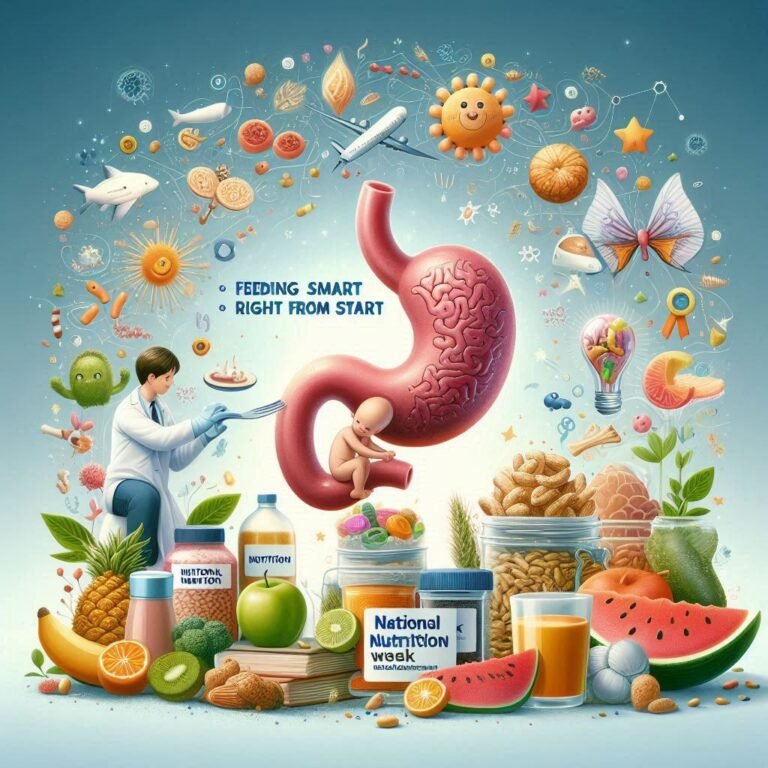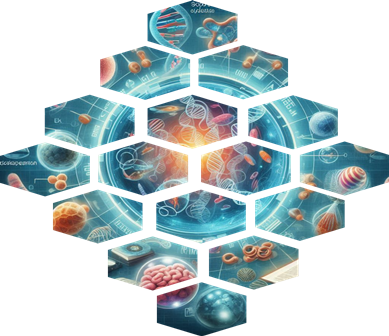As India celebrates National Nutrition Week from September 1st to 7th, 2024, the theme “Feeding Smart Right From Start” resonates with the nation’s commitment to nurturing a healthier future generation. This year’s theme emphasizes the importance of instilling nutritional knowledge early in life, ensuring that children grow up making informed dietary choices that will benefit them throughout their lives.
The role of microbes in nutrition is a fascinating and crucial aspect of our health that often goes unnoticed. The human gut harbors a complex and dynamic population of microorganisms, collectively known as the microbiome. These microscopic inhabitants play a pivotal role in our nutritional health, influencing everything from digestion to disease resistance.
Microbes and Their Nutritional Benefits
The microbiome consists of trillions of bacteria, fungi, parasites, and viruses that coexist within our bodies. In a healthy individual, these microorganisms maintain a delicate balance, contributing to our well-being. They stimulate the immune system, aid in the breakdown of potentially toxic food compounds, and synthesize essential vitamins and amino acids, including the B vitamins and vitamin K. The microbiome’s ability to ferment indigestible fibers results in the production of short-chain fatty acids (SCFAs), which serve as a nutrient source for the body and play a role in preventing chronic diseases.
The Symbiotic Relationship
The relationship between humans and their gut microbes is symbiotic, meaning both parties benefit. The human host provides a habitat and nutrients for the microbes, while the microbes, in return, contribute to the host’s nutrition and health. This relationship is influenced by various factors, including diet, which can significantly alter the composition of the microbiome. A diet rich in diverse, fiber-filled foods tends to promote a beneficial microbiome, whereas a diet lacking in variety or high in processed foods can lead to dysbiosis, an imbalance that may increase disease risk.
Microbes and Child Nutrition
During National Nutrition Week, special attention is given to the nutritional needs of children. The microbiome is established early in life and is influenced by factors such as delivery method at birth and breastfeeding. The initial composition of an infant’s microbiome can have lasting effects on their health. Therefore, educating parents and caregivers about the impact of diet on the microbiome is crucial for the development of children’s long-term health and nutritional status.
The Future of Nutrition and Microbes
Research into the microbiome is ongoing, and its implications for nutrition are vast. Understanding the complex interactions between diet and the microbiome can lead to personalized nutrition strategies that cater to an individual’s unique microbial composition. As we continue to unravel the mysteries of the microbiome, we may discover new ways to prevent and treat diseases through dietary interventions that support a healthy microbiome.
Improving Gut Health: Practical Tips for a Balanced Microbiome
Gut health is a critical aspect of overall well-being, influencing everything from digestion to mental health. A balanced gut microbiome can lead to improved digestion, enhanced immune function, and a reduced risk of various diseases. Here are some practical ways to nurture your gut health:
1. Incorporate Probiotics and Fermented Foods: Probiotics are live beneficial bacteria that can help balance the gut microbiome. Fermented foods like yogurt, kefir, kimchi, kombucha, and sauerkraut are natural sources of probiotics.
2. Consume Prebiotic Fiber: Prebiotics are nondigestible carbohydrates that feed probiotics. Foods rich in prebiotic fiber include asparagus, bananas, chicory, garlic, onions, and whole grains.
3. Reduce Sugar Intake: High consumption of sugar and artificial sweeteners can disrupt the balance of gut microbes, leading to dysbiosis. Limiting sugar intake can help maintain a healthy gut flora.
4. Manage Stress: Chronic stress can negatively affect gut health. Engaging in stress-reducing activities such as meditation, yoga, or regular exercise can promote a healthier gut environment.
5. Exercise Regularly: Physical activity can enhance the diversity and number of beneficial bacteria in the gut, contributing to overall gut health.
6. Get Adequate Sleep: Sleep plays a vital role in maintaining a healthy gut microbiome. Ensuring you get enough quality sleep can support gut health.
7. Avoid Unnecessary Antibiotics: Antibiotics can disrupt the gut microbiome by killing beneficial bacteria. Use antibiotics only when prescribed and necessary.
8. Stay Hydrated: Drinking plenty of water is beneficial for the mucosal lining of the intestines and can help maintain a balanced gut microbiome.
9. Eat a Plant-Based Diet: Diets rich in fruits, vegetables, nuts, seeds, and beans can positively affect gut health by promoting the growth of beneficial bacteria.
10. Include Foods for Gut Health: A balanced diet with a variety of fruits and vegetables provides the fiber that builds good bacteria. Foods like kefir and other fermented or pickled foods also support gut health.
By incorporating these practical tips into your daily routine, you can take significant steps toward improving your gut health and, consequently, your overall health and well-being. Remember, a healthy gut is a cornerstone of a healthy body.
Conclusion
National Nutrition Week 2024 serves as a reminder of the intricate connections between our diet, our microbes, and our health. By focusing on “Feeding Smart Right From Start,” India highlights the foundational role of nutrition in shaping the health of future generations. As we celebrate this week, let us acknowledge the silent yet powerful role that microbes play in our nutrition and embrace the dietary choices that foster a beneficial microbiome for a healthier tomorrow.
AIPH University has taken a pivotal role in the celebration of National Nutrition Week 2024 in India, aligning with the theme “Feeding Smart Right From Start.” The institution has embarked on a mission to enlighten the community about the significance of nutrition from an early age, emphasizing the role of microbes in nutrition. The university’s engagement in National Nutrition Week stands as a testament to its commitment to nurturing a healthier future through education and awareness.






